#history patchwork
Explore tagged Tumblr posts
Note
The way that my brain broke at your last post - oh my goodness Peter didn’t really go to school and is missing so much information and doesn’t know JFK. He only knows the Founding Fathers from Hamilton the Musical. Well, the obvious solution is the musical-ify all of US History.
he's been taking remedial classes but if he's not interested in smth it's impossible for him to retain the information. he's like "yeah i know the laws of thermodynamics. i am confused about the branches of the government." he's knows about the boston tea party and he hates christopher columbus but he does not understand what the stock market is. it is entirely a gamble on what peter will know. well not really a gamble because it's mostly 7th-9th grade history that he's confused about
#erinwantstowrite#ao3#ao3 fanfic#leap of faith ao3#peter parker#leap of faith catch me if you can#thank you for the ask!#leap of faith#“dan has a strange patchwork of knowledge” but it's peter#“we purchased Louisiana”#“do you know that because of Hamilton”#“...no...”#the REAL reason Ned showed him Hamilton was because it was an intro to learning some history he missed LMFAO#Ned being a history nerd is my fav btw#so Ned is tutoring him on stuff
132 notes
·
View notes
Text
Here are two of the most hilariously scalding letters from the 1800s that I have ever read. One is by the famous writer Lord Byron, and the other is by his daughter Ada Lovelace, the famous mathematician. Both are written to their respective business partners: Byron to his publisher John Murray, and Lovelace to her colleague Charles Babbage. It’s interesting to note how strikingly similar these letters are despite the fact that Ada and her father never knew each other, as her parents separated shortly after her birth and he died abroad when she was eight. Both were rebellious, fond of gambling, prone to tumultuous affairs, and both hated Lady Byron. These similarities may help to explain why her final wish was to be buried next to him instead of her family.
Lord Byron in a Letter to his publisher John Murray about the printing of his magnum opus, the poem Don Juan:
“Ra. August 31st. 1821.
Dear Sir
I have received the Juans – which are printed so carelessly especially the 5th. Canto – as to be disgraceful to me — & not creditable to you.
It really must be gone over again with the Manuscript – the errors are so gross – words added – changed – so as to make cacophony & nonsense. — You have been careless of this poem because some of your Synod don’t approve of it – but I tell you – it will be long before you see any thing half so good as poetry or writing. — Upon what principle have you omitted the note on Bacon & Voltaire? and one of the concluding stanzas sent as an addition? because it ended I suppose – with –
‘And do not link two virtuous souls for life Into that moral Centaur man & wife?’
Now I must say once for all – that I will not permit any human being to take such liberties with my writings – because I am absent. —
I desire the omissions to be replaced (except the stanza on Semiramis) particularly the stanza upon the Turkish marriages – and I request that the whole be carefully gone over with the M.S.S. –
I never saw such stuff as is printed – Gulleyaz – instead of Gulbeyaz &c. Are you aware that Gulbeyaz is a real name – and the other nonsense? – I copied the Cantos out carefully – so that there is no excuse – as the Printer reads or at least prints the M.S.S. of the plays without error. —
If you have no feeling for your own reputation pray have some little for mine. — I have read over the poem carefully – and I tell you it is poetry – Your little envious knot of parson-poets may say what they please — time will show that I am not in this instance mistaken. — Desire my friend Hobhouse to correct the press especially of the last Canto from the Manuscript – as it is – it is enough to drive one out of one’s senses – to see the infernal torture of words from the original. – For instance the line
‘And pair their rhymes as Venus yokes her doves’
Is printed
‘and praise their rhymes &c. –
also ‘precarious’ for ‘precocious’ – and this line. stanza 133.
‘And this strong extreme effect – to tire no longer’
Now do turn to the Manuscript – & see – if I ever made such a line – it is not verse. —
No wonder the poem should fail – (which however it wont you will see) with such things allowed to creep about it. – – Replace what is omitted – – & correct what is so shamefully misprinted, – and let the poem have fair play – – and I fear nothing. — I see in the last two Numbers of the Quarterly – a strong itching to assail me (see the review of the “Etonian”) let it – and see if they shan’t have enough of it. – – I don’t allude to Gifford – who has always been my friend – & whom I do not consider as responsible for the articles written by others. – But if I do not give Mr. Milman – Mr. Southey – & others of the crew something that shall occupy their dream! I am not what I was – that is all
I have not begun with the Quarterers – but let them look to it. – As for Milman (you well know I have not been unfair to his poetry ever) but I have lately had some information of his critical proceedings in the Quarterly which may bring that on him which he will be sorry for. – I happen to know that of him – Which would annihilate him – when he pretends to preach morality – not that he is immoral – because he isn’t – having in early life been once too much so. – And dares he set up for a preacher? let him go and be priest to Cybele. – why let
You will publish the plays – when ready — I am in such a humour about this printing of D.J. so inaccurately – that I must close this.
yrs. [scrawl]
P.S. I presume that you have not lost the stanza to which I allude? it was sent afterwards look over my letters – & find it. The Notes you can’t have lost – you acknowledged them – they included eight or little corrections of Bacon’s mistakes in the apothegms. – And now I ask once more if such liberties taken in a man’s absence – are fair or praise-worthy? – As for you you have no opinions of your own – & never had – but are blown about by the last thing said to you no matter by whom.”
[Separate page]
“Dear Sir
The enclosed letter is written in bad humour – but not without provocation. -
However – let it (that is the bad humour) go for little – but I must request your serious attention to the abuses of the printer which ought never to have been permitted. – You forget that all the fools in London (the chief purchasers of your publications) will condemn in me the stupidity of your printer. — For instance in the Notes to Canto fifth – ‘the Adriatic shore of the Bosphorus – instead of the Asiatic!! – All this may seem little to you – so fine a gentleman with your ministerial connections – but it is serious to me – who am thousands of miles off & have no opportunity of not proving myself the fool yr. printer makes me – except your pleasure & leisure forsooth.
The Gods prosper you — & forgive you, for I wont.
B.”
Ada Lovelace in a letter to her work partner Charles Babbage, who she helped invent the computer with:
“Tuesday Afternoon [1 August 1843] Ockham
. . . Note B has plagued me to death; altho' I have made but little alteration in it. Such alterations as there are however, happen to have been very tiresome & to have demanded minute consideration & very nice adjustments.
It is a very excellent Note.
I wish you were as accurate, & as much to be relied on, as I am myself. You might often save me much trouble, if you were; whereas you in reality add to my trouble not infrequently; and there is at any rate always the anxiety of doubting if you will not get me into a scrape; even when you don't.
By the way, I hope you do not take upon yourself to alter any of my corrections.
I must beg you not. They all have some very sufficient reason. And you have made a pretty mess & confusion in one or two places (which I will show you sometime), where you have ventured in my M.S's, to insert or alter a phrase or word; & have utterly muddled the sense.
I could not conceive at first in one or two places what had happened to my sentences; tho' I soon saw they were patchwork & not my own; and found it so, on referring to the M.S. I fear you will think this a very cross letter. Never mind. I am a good little thing, after all. Yours ever
A. A. L.
Later. P. S. It is impossible to send you anything but Notes B and C; (& this partly owing to some wrong references & blunderations of your own). — Do not be afraid, for I will work like the Devil early tomorrow morning. —“
[Separate Page]
“Wednesday, 4 o'clock [2 August 1843] Ockham
After working almost incessantly, since 7 o'clock this morning, until I am forced to give in from sheer inability to apply longer, I find only the sheet I enclose is quite completed. I shall however send a servant up tomorrow morning by a ten o' clock train, to take you all the rest; so that you will have it almost as soon as this letter.
You cannot conceive the trouble I have had with the trigonometrical Note E. — In fact no one but me, I really believe, would have doggedly stuck to it, as I have been doing, in all wearing minutiae.
I am very uneasy at not hearing from you, as I have expected to do both yesterday & today; & fear some disaster or other. I hope all of Note G is forthcoming; & I also hope you have received all my communications safely.
I think you had better do the second revise of the translation for me. If you will compare it carefully with my first revise, it can hardly be necessary I think for me to go over it again.
I suppose I ought to take it for granted that no news is good news; but I am in a sad fidget. — Yours ever
A. L.”
#‘no wonder the poem should fail’ ‘i fear nothing’#‘i am in such a humour’ ‘the stupidity of your printer’#‘the gods prosper u & forgive u - for i wont’#‘all the fools in london (the chief purchasers of your publications)’#‘i wish u were as accurate and to be relied upon as myself’#‘you in reality add to my trouble not infrequently’#‘they were patchwork & not my own’#literature#english literature#dark academia#poetry#romanticism#lord byron#history#writing#ada lovelace#computer history#computer science history#math history#literary history#letters#funny#1800s#victorian#regency#drama#historical#humour#lit#correspondence
180 notes
·
View notes
Text
18th century inspired tye on pocket that I finally finished today
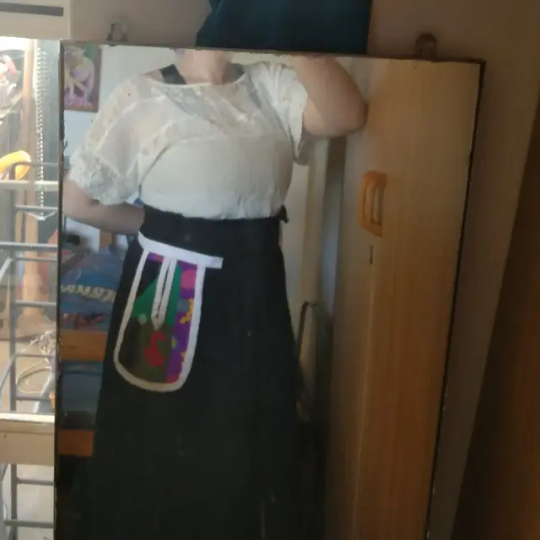
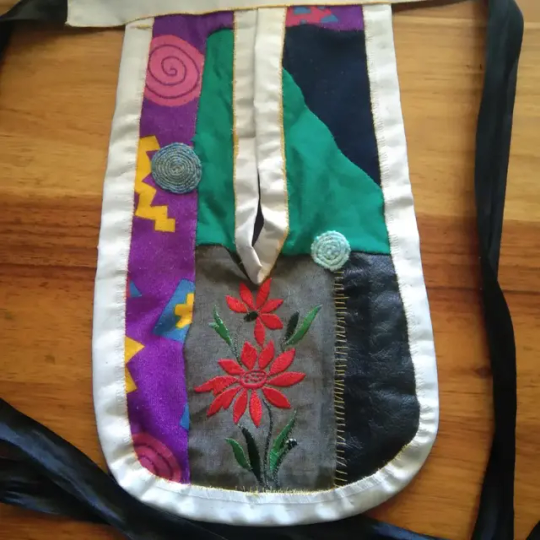
65 notes
·
View notes
Text
youtube
"Together we can be transformed to be united and repurposed to work and keep us a harmonious collective through the concept of faith and the circulatory of generosity and the human spirit."
All the reflections at the end of the video are so relevant and meaningful, and beautifully connects the art of pojagi to the human experience as a collective.
3 notes
·
View notes
Text
GT July - Caught
I knew what everybody else was going to do for this prompt, but decided to mix it up rather than post the ol' First Meeting trope
(It works out well because tomorrow's prompt…)
Word Count: 600
Character bios in my pinned post.
CWs: None that I can think of at all.
========
How long could she go without mentioning it? Clearly Patch hasn't said anything, but he has to know that she knows, right? Maybe it's not… as weird for him? Is she being insensitive?
Mel tried to bring it up gently a few times, asking him about his little pulleys he'd set up. Except for the… odd material choice, it was actually pretty detailed. It only made sense, as the small creature had been working on it for practically the entire month he had been here. It was a platform, almost like a cable car, stretching from the countertop where his outlet room was, to the floor. Supporting it was an almost impressive amount of engineering, considering it was mostly made of office supplies and a few nails. And…
Okay, I have to at least ask him, Melody thought as she walked into the kitchen. "Hey, Patch, are you around? Do you have a minute?"
They knew from the light outside his room that he was home, but it was still polite to ask. She could hear rattling around in his room, before he showed up, a strange guilty expression on his face.
"Listen, I need to ask you about something that's bothering me. Nothing wrong! You're not in trouble! Just, uh…" Melody stammered, trying to think of the words.
"So… I know you like to, y'know… find your little materials wherever you can. And that's fine! I support that, and I support you. I've even ignored it when you take stuff from me, you know?"
Mel could tell by the nervous look her tiny roommate was giving that he had an idea where this was going. They took a deep breath and composed themself before getting to the point. "But dude, we gotta talk about my hairbrush, though. Really?"
Patch instantly got nervous, eyeing the rope he had installed recently. He turned to Melody and gave his best look of fake confusion and a shrug, to her amusement. For as long as she has known him, Patch has worn his heart on his sleeve, he couldn't lie to save his life.
"You know exactly what I'm talking about, Patch. Unless you just happened to find rope in my exact hair color? After my brush mysteriously cleaned itself? Is there really… you could have like… asked me for help, or… something. There are materials that would be so much better… and less… from my body?"
Mel seemed to be at a loss for words, which was unfortunate since she usually had enough words for the both of them. Patch was nervously fidgeting with one of his ears, completely flustered as he realized that Melody must consider this a faux pas of some sort. Finally, the human awkwardly spoke again.
"Listen, I gotta head out to work… but look, I… don't feel like you have to take everything down, I don't want you to destroy all of your hard work, just… going forward…?"
After a second that felt like a year, they both nodded in an awkward agreement at this compromise. "Cool, I'll… see you later, then."
Melody went off to work, and Patch resumed his renovations to Mel's counter, considering what changes would be needed to uninstall the current ropes and find a substitute that would offend his roommate less. Later that evening, Melody wordlessly placed two rolls of dental floss by Patch's little improvised door. One the classic white, and one a teal color, reminiscent of her hair color.
#oc tag: patch#oc tag: mel#patchwork melody#g/t#giant/tiny#g/t ocs#g/t writing#gtjuly#fun fact! apparently you can actually make ropes from human hair and they actually have an impressive tensile strength.#i love my search history when in sizey moods my fbi agent is probably so confused
11 notes
·
View notes
Text
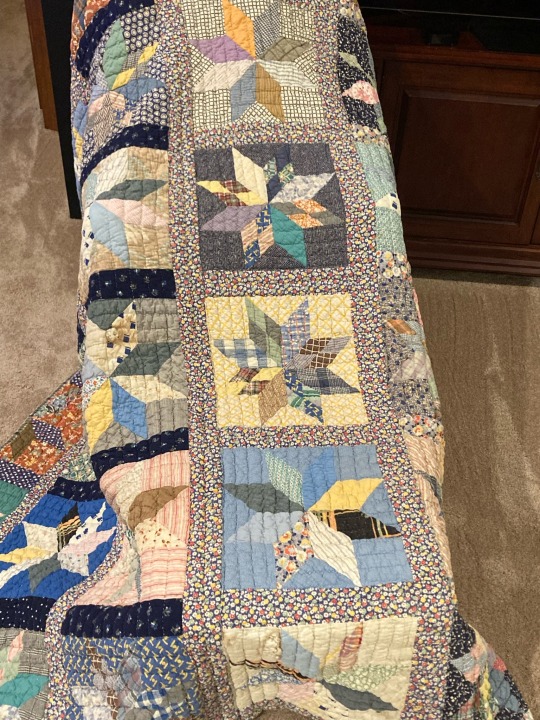
My parents inherited this quilt from my great-grandmother, but the maker and date are unknown. With no repeating color scheme, it appears to be constructed from a variety of scrap fabrics including shirting, feed sacks, and a few polyester pieces. It is self-bound (the binding is made from the backing). Two edges include half-squares with a different border fabric, suggesting that the quilt top was expanded beyond its original dimensions at some point. The filling is exposed due to damage in several areas, and seems to be cotton batting. The entire quilt is hand-quilted with thick white thread in a running stitch, but the piecing appears to be a mixture of running stitch in the same thread and machine lockstitch in thinner white thread. The binding stitches are quite far apart and perpendicular to the binding edge (this is distinct from a whipstitch, but I don’t remember the name). It’s a very interesting historical textile! My mother is planning to patch the holes and display the quilt on an unused bed.
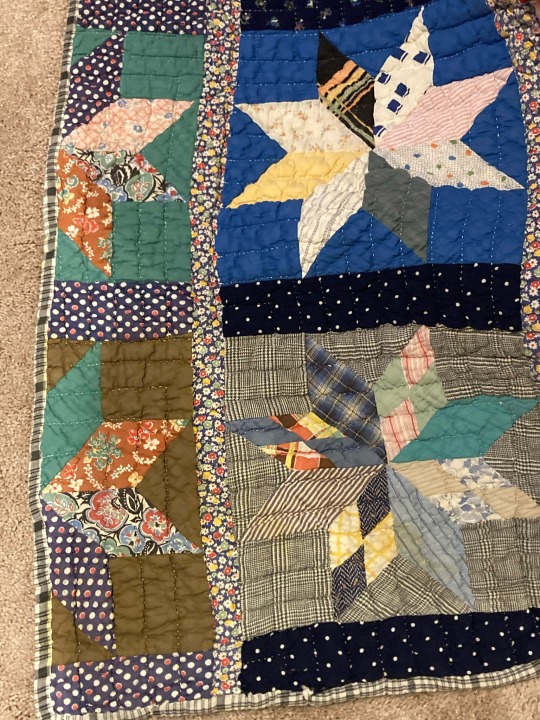
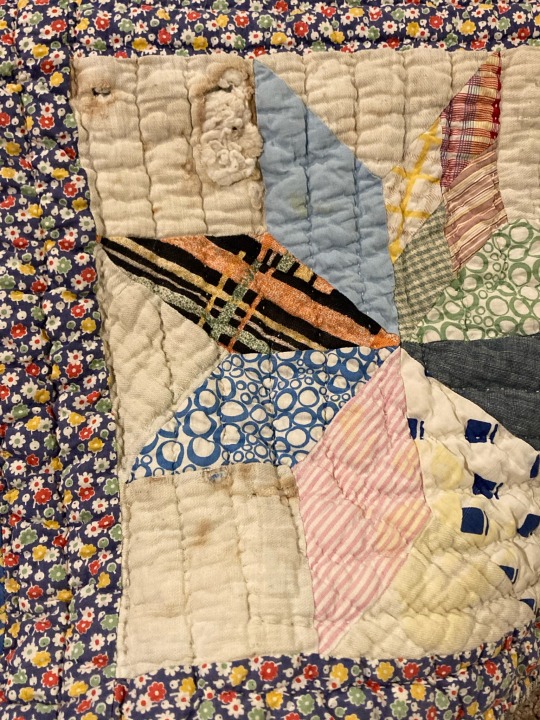
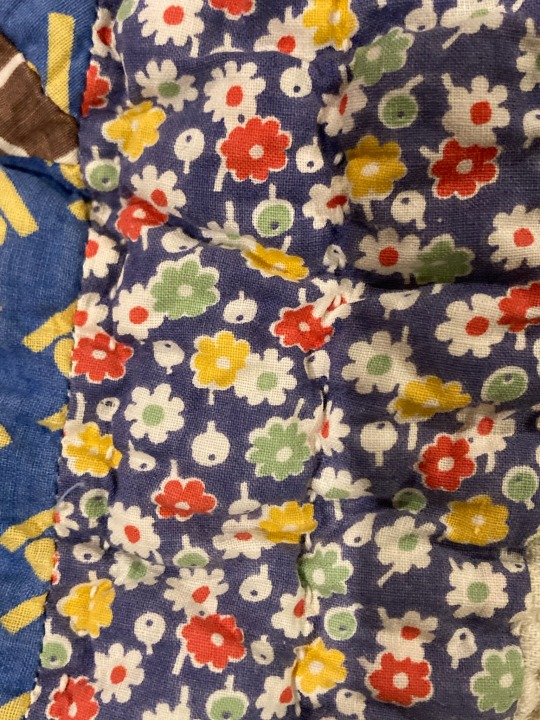
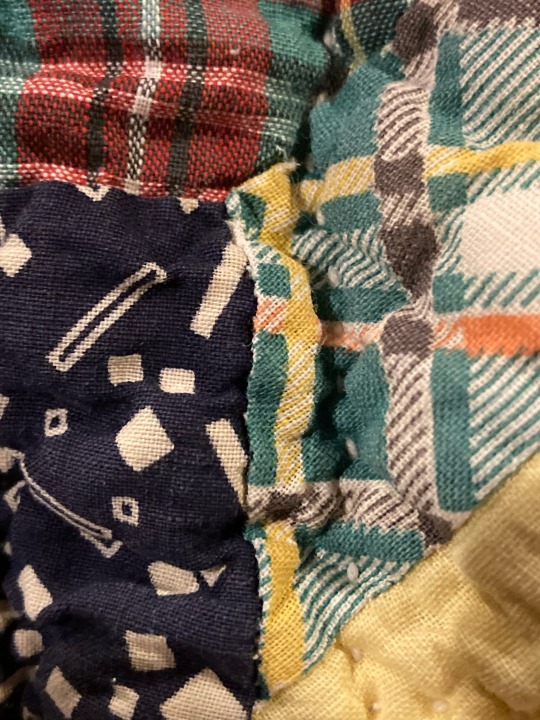
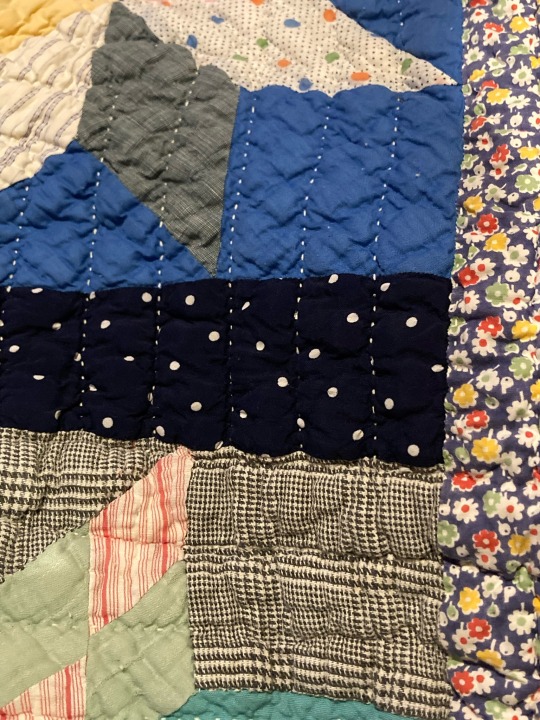
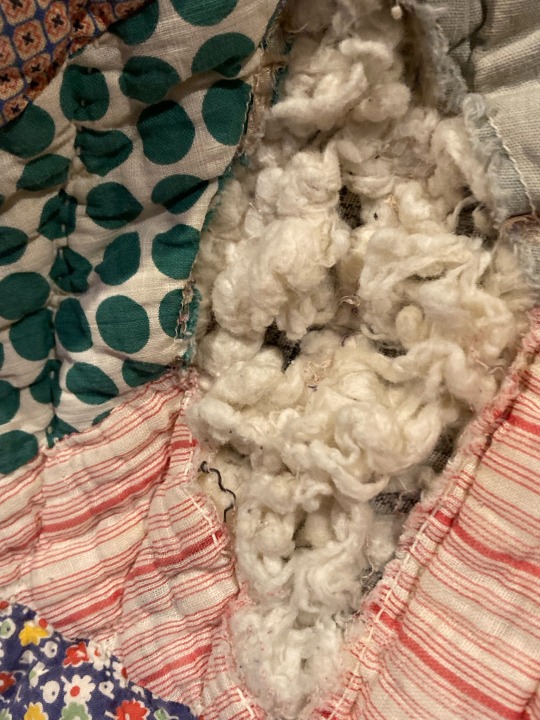
6 notes
·
View notes
Text
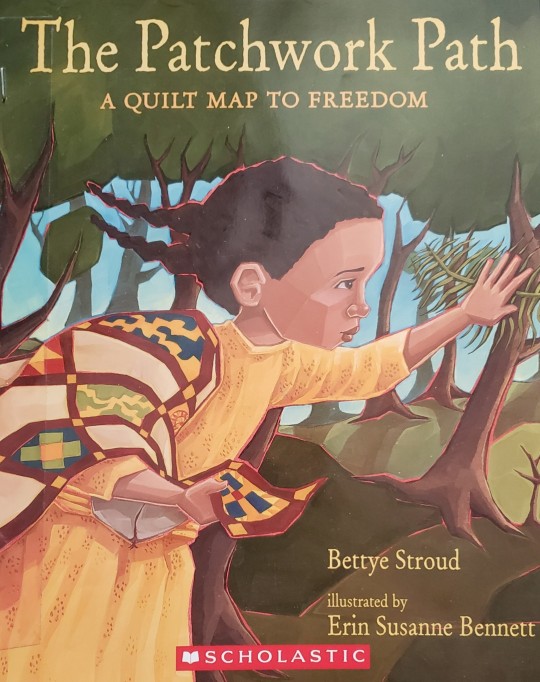
The Patchwork Path: A Quilt Map to Freedom (2005)
Story: Bettye Stroud -- Art: Erin Susanne Bennett
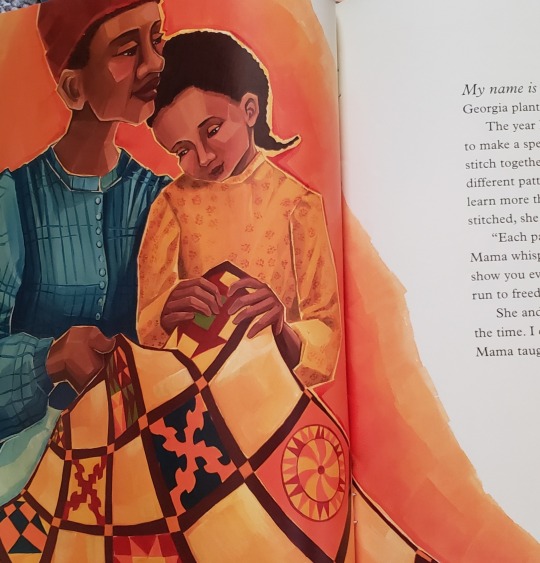
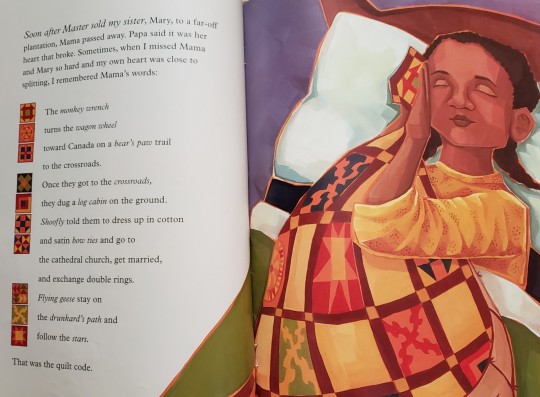
#the patchwork path#a quilt map to freedom#2000s#00s#Bettye Stroud#Erin Susanne Bennett#underground railroad#historical fiction#kid books#kidlit#children's books#picture books#history#slavery
5 notes
·
View notes
Text
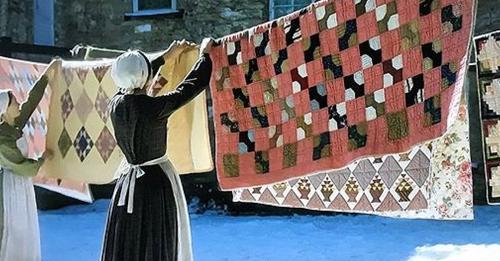
Patchwork quilts and their storytelling potential in Alias Grace
4 notes
·
View notes
Text
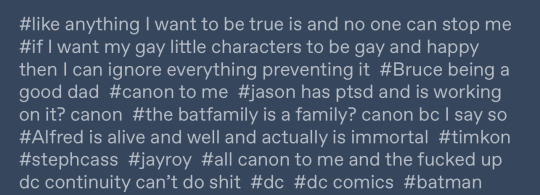
The only approach to canon im interested in
honestly one of the main reasons I like dc is that they can’t keep a storyline straight for shit. anything I don’t like is just *not real*. that’s different storyline babes what are you talking about???
like at this point I can consider shit like wfa and hell even well written fanfics as canon bc who knows what’s going on with those funky little people?? certainly not the dc writers
#half this shit isn’t even my personal headcanon/fanon#but I love a canon buffet#also there is SO MUCH HISTORY for you to choose from#patchwork canon#make it up#woo
5K notes
·
View notes
Text
The Rise of Patchwork Quilting in the 18th and 19th Centuries in British History: Why British Women Embraced Quilting

1 note
·
View note
Text
In Jerusalem by Tamim Al-Barghouti - Translated by Anas and Amena, based off Houssem Ben Lazreg
In Jerusalem
We passed by the beloved’s house, but were turned away by the enemy’s laws and the enemy's wall.
I told myself, “Maybe, that is a blessing,” for what will you see in Jerusalem when you visit it?
You will see all that you cannot endure, when its houses appear by the side of the road.
And not every soul rejoices when it meets its beloved, nor does every separation harm it.
For if their meetings pleased it before separation, That pleasure is not, after their reunion, guaranteed.
Once you set your eyes on Old Jerusalem one time, your eyes will then see it, wherever you set them. ……………………………………………………………………………….
In Jerusalem is a greengrocer from Georgia, annoyed with his wife, thinking of going on vacation or of painting his house.
In Jerusalem is a Torah and an elderly man come from Upper Manhattan to teach Polish boys its commandments.
In Jerusalem is an Ethiopian policeman closing off a street in the marketplace. A machine gun on a settler not yet twenty. A hat greeting the Wailing Wall.
And European tourists who do not see Jerusalem at all. You see them taking pictures of each other with a Palestinian woman who sells radishes in public squares all day long.
In Jerusalem the soldiers marched with heavy boots over the clouds. In Jerusalem we prayed on the asphalt. In Jerusalem is…whomsoever is in Jerusalem…but you.
And History turned to me and smiled: "Did you really think that your eye would overlook them and see other than them? Here they are in front of you; The text, of which you are the footnote and margin.
O son, did you think that a visit would lift off of the city’s face the thick veil of its reality, so that you may see what you desire? In Jerusalem is every young man…but you.
It is the deer in the distance whom fate decreed stay out of reach, you still chase after her ever since she said goodbye with a tear. Go easy on yourself for a moment, I see that you have become weak… In Jerusalem is…whomsoever is in Jerusalem…but you."
O chronicler of history, wait a minute for the city’s timeline is twofold: One is foreign, serene, with steady steps as if sleepwalking And there is another, hidden, masked, walking silently, cautious of the first…
And Jerusalem knows itself. Ask the people there everyone will guide you, for every thing in the city has a tongue eloquent when you ask it.
In Jerusalem the crescent becomes more curved, like an embryo, bending towards its likenesses over the domes, developing with them over the years a relationship, as of a father to his sons.
In Jerusalem are buildings whose stones are quotations from the Bible and the Quran.
In Jerusalem the definition of beauty is a blue octagon, on top of it, dear friend, lies a golden dome that looks to me like a convex mirror in which heaven’s face is reflected, coddled, drawn near, distributed like aid to the needy as they are besieged when they appeal to God after a Friday sermon. In Jerusalem the sky is amongst us, we protect it and it protects us, and we would carry it on our shoulders if Time ever oppressed its moons.
In Jerusalem are dark marble columns, the veins in the marble resemble smoke. And windows, high on mosques and churches, taking Dawn by hand to show it how engraving in colour is done.
Dawn says, “like this,” and the windows reply, “no, rather like this.” And whenever this debate lasts long, they compromise. For Dawn is free outside the thresholds, but if it ever wishes to enter it is bound to the rules of the windows and their Lord.
In Jerusalem there’s a school built by a Mameluke who came from beyond the river, was sold at a slave market in Isfahan, to a merchant from Baghdad, who traveled to Aleppo, and gave the Mameluke to Aleppo’s Prince, Fearing the blueness in the Mameluke’s left eye, the Prince gave him to a caravan heading for Egypt where soon, he became the vanquisher of the Moguls and the Sovereign Sultan
In Jerusalem is a scent that captures the essence of Babylon and India at an herbalist’s shop in Khan El Zeit. A scent that I swear has a language you will understand if you listen to; And it says to me when they fire tear gas at me “Don’t worry about them.” And it fills the air again as the gas fades away and it says to me: “Do you see?”
In Jerusalem contradictions are in agreement, and the wonders people cannot deny; they check them out like pieces of cloth, old and new, and the miracles there they touch with their hands.
In Jerusalem if you shake hands with an old man or touch a building, you will find engraved on your palm, my friend, lines of a poem or two.
In Jerusalem despite the succession of calamities a breeze of innocence fills the air, a breeze of childhood. And you will see doves flying declaring the birth of a state between two bullets.
In Jerusalem the rows of graves are lined like they are the lines of the city’s history, and the book is its soil.
Everyone has passed through here for Jerusalem welcomes all who come to it. Walk through it, and read its gravestones in the languages of all peoples of the Earth. There are the Africans, Europeans, Kipchaks, Slavs, Bosniaks, Tatars, Turks, the believers, disbelievers, poor, rich, sinners, hermits. In here are all the peoples that have ever walked the face of the Earth.
Oh chronicler of history! What has happened that you have excluded us? Have you found that we are the only ones with no place left for us in the city? Re-write and read again for I see that you have erred.
My eyes close, then look again. The driver of the yellow car heads north, away from the city’s gates, and now Jerusalem is behind us.
My eyes see it in the right-side mirror, as its colors have changed in the sun before sunset, when a smile surprised me, how it sneaked onto my face, I do not know.
It said to me after all this pondering: “O you weeping behind the city wall, are you a fool? Have you lost your mind? Do not weep O you who have been excluded from the text of the book. Do not weep O Arab, and know surely that
In Jerusalem is whomsoever is in Jerusalem but…In Jerusalem I see no one…but you.”
-
Original source: https://www.youtube.com/watch?v=SVYbsjK4nVA
#I think this is the second last poem to be read#I think only some of it was done (it was in arabic) but i found the translation of the whole thing#i think this poem captures powerfully the contrast of living under occupation#and also the pain in it#the reprimanding tone giving way to gentleness#then the city comes alive in the poem#a patchwork of peoples and wonderful in its multiplicity..#i especially like the part about the dawn obeying God#and then the city itself gives strength to the poet#it tells him it is his home#the reassuring tone at the end is getting me tbh#it focuses on one person visting Jerusalem yet its so wide in its scope i think#to all the Palestinians turned away from their homes and holy places#the sun changing..him smiling...so much narrative beauty in this poem#It flows like a tapestry#though not without interruption- i think that part just shows the reality though#i like how this blends history and present as well#i have to emphasize i love the citys personification#tamim al-barghouti#free palestine#palestine#poem#quote
0 notes
Text
i think woven was the most common, being the most durable to wash and wear, though of course weaving in a pattern does increase the expense of an item, since it means you have to start with colored thread (more expensive) and invest more time and care in the manufacture than if you dye after weaving.
embroidery is relatively fragile, so you'd want a lot of it on a Fancy blanket but not one that's going to see a lot of use, and medieval dyes weren't typically very fast, so dye printing wasn't really A Thing in europe afaik. but you have (comedically given i know you quilt) left out the option of patchwork.
patchwork played a much bigger role in medieval textiles than it does today, since the value of fabric was so much higher; patching the good parts of multiple worn garments together into something new was a genuinely practical option in a lot of scenarios, rather than the offbeat fashion choice or way to save money on a sewing hobby it generally is today.
i don't think i've read about it in the context of medieval blankets specifically, but it comes up wrt clothing, and a blanket is a simpler project than most garments even if it's also larger than most of them, so i can't imagine that patchwork didn't feature in the blanket pattern game.














medieval beds & sheets
collection of 15th c. manuscript illustrations
sources/links: Chantilly, Bibl. et Archives du Château, Ms. 388, fol. 8v // Paris, BnF, Français 96, fol. 17r // Paris, Bibl. Mazarine, Ms. 955, fol. 10v // Munich, BSB, Cgm 503, fol. 36v // Paris, BnF, Français 112 (1), fol. 244v // Frankfurt, UB, Ms. germ. qu. 12, fol. 50r // Paris, BnF, Français 119, fol. 398v // Karlsruhe, BLB, Cod. Donaueschingen 145, fol. 91r // Berlin, SBB, Ms. germ. fol. 1, fol. 86v // Munich, BSB, Cgm 8010a, fol. 22r // Genève, Bibl. de Genève, Ms. fr. 165, fol. 7r // St. Gallen, Kantonsbibl., VadSlg Ms. 343c, fol. 27r // Paris, BnF, Ms-5070 réserve, fol. 12v // Los Angeles, Getty Museum, Ms. 33, fol. 210r
#i don't think 'patchwork blanket' is the sort of thing#one would expect to necessarily show up in the historical record#but i also don't know it's not there just that i haven't encountered it#also what the fuck tumbr why is the tag you suggest when i started iwth 'i'#'i just want to be skinny'#how many people are using that tag#why#i have never seen it#anyway#history#blankets#roach-works
2K notes
·
View notes
Note
Sorry if I'm asking this again I just don't know if my ask went through because my phone was glitching out at the moment.
Does Sparkplug still see Op now that she's older and does it happen less than when she was younger? Also, has Sparkplug ever told anyone that she could see him or has she kept it a secret all this time?
(sorry if this is a word vomit type question this is my first ask and I'm nervous because you inspire me sm😭)
As she got older, she saw him less and less. I image it was her spark becoming less of a patchwork of Optimus and Megs, and her own personal spark. So as much as he would try to see her, his connection to the mortal world slowly disappeared.
As a baby she didn’t really understand what he was, he did small things. Tucking her in at night, unlocking the energon snack box for her, and making sure she didn’t get hurt when someone wasn’t keeping an eye on her 24/7.
Later he was simply a imaginary friend, he would sit and listen to her talk about silly history facts, open the training room for her (she wasn’t allowed to train for battle) and helping her find things she lost.
As of current day, she’s more convinced that he’s just a hallucination caused by the anxiety of being Optimus Prime’s daughter. She’ll see a glimpse of him after being rejected for scout try outs, see him sitting in the library for a moment when she’s hiding there, and seeing him sitting next to her after getting in an argument with Megatron or Elita.
She had tried to tell others but they mostly thought she was playing, it’s not hard to imagine she’d create an idea of Prime from reading about him.
Prime tried to be there as much as he could, he really did. He loves Sparkplug as much as he loves his older children. He would do whatever he could to make sure his last sparkling got a chance to live in a free world.
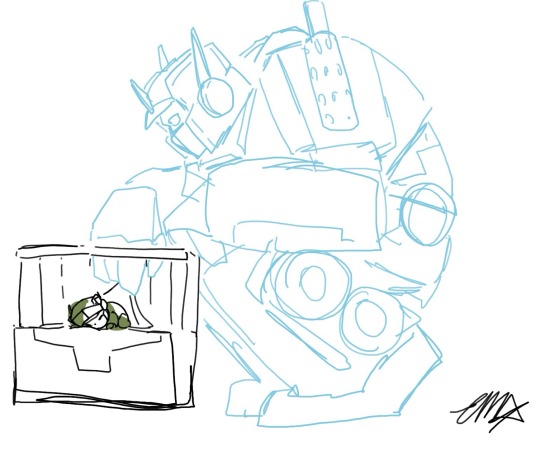
#digital art#drawing#illustration#artists on tumblr#fanart#art#oc#transformers g1#transformers#transformers one#transformers idw#tf optimus prime#optimus prime transformers#optimus prime#megatron transformers#megatron#tf megatron#megop#megoplita#oplita#elita#elita one#Sparkplug#tf sparkplug#one spark au
577 notes
·
View notes
Text
All British American Boy
(All characters are 18+)
Matthew Hastings leaned his forehead against the cool glass of the airplane window, watching as the endless patchwork of green and brown fields below gave way to the sprawling suburban grid. He adjusted his glasses and ran a hand through his messy brown hair, feeling a knot of nerves tighten in his stomach. He had read every guidebook, watched countless YouTube videos, and even practiced a Midwestern accent as a joke, but nothing could prepare him for actually being here—America.
More specifically, the East Coast of California, a small town near the beach where he’d spend his gap year as an exchange student before university. For an 18-year-old British boy with a penchant for sci-fi novels, indie music, and political debates, it felt like stepping into a completely different world.
At the airport, Matthew’s host family greeted him with big smiles and even bigger hugs. The Bennetts were the epitome of California Americana: Todd, the jovial dad in a baseball cap; Lisa, the bubbly mom with a perpetual tray of cookies; and Chase, their athletic, all-smiles son who was also 18. Chase was a senior at the local high school and the starting quarterback of the football team.
“Matthew,” Lisa said brightly as they piled into the family’s SUV. “What a great name! So classic. So All-American!”
Matthew blinked. “Uh, thanks?”
Chase chuckled from the backseat, where he sat next to Matthew. “Yeah, bro, it’s perfect. You’re gonna fit right in.”
Matthew wasn’t so sure about that, but he forced a polite smile.
The first day at school was a blur of introductions and unfamiliar faces. Everyone seemed fascinated by his accent, asking him to say random words like “bottle” and “aluminium,” which felt strangely alien to Matthew, now that he was in a place where everyone had the same cadence and lingo. It wasn’t long before his name became a subject of constant discussion.
As Matthew walked into the school, he could feel eyes on him. Cheerleaders, jocks, and teachers alike seemed to zero in on him, exchanging knowing glances.
One of the cheerleaders, a blonde girl with a smile that could light up a room, grinned as she approached. “Matthew, huh? Your name sounds so... All-American,” she said, giggling. “You’re not secretly a football player, are you?”
Matthew blinked, caught off guard. “Uh, no, not really.”
“Pfft, I bet you could be,” she teased, tossing her hair over her shoulder as she walked off, still chuckling. “We need more guys like you on the team. You’d fit right in.”
As Matthew made his way through the crowded hallways, another guy—a tall jock in a varsity jacket—clapped him on the back as he passed. “Matthew, huh? Dude, that’s a name you can take to the bank. Like, you’re straight outta one of those All-American movies, right?”
Matthew managed a smile, but inside, he was still trying to make sense of it all. What did they mean? What was this weird association everyone seemed to have with his name?
“Yeah, man,” another guy, a friend of the first, added as they walked past, “you’re gonna be a star here. Football, maybe? You look like you belong on the field.”
Later that day, in history class, his new teacher, Mr. Henderson, remarked on his name with an enthusiastic grin. “Matthew. Now that’s a name I can get behind! Really sounds like the kind of guy who’d be representing the All-American spirit. You’re the pride of your country, huh?”
Matthew, unsure how to respond, simply nodded. “Yeah, I guess.”
“Cool, cool,” Mr. Henderson said, adjusting his glasses. “You’re going to get along great here.”
During lunch, as Matthew stood in line, he overheard a conversation between a group of cheerleaders. They were talking about the new kid—him—and they couldn’t stop commenting on his name.
“That Matthew kid?” one of the cheerleaders said, flipping her hair. “Totally All-American. I swear, he looks like he just stepped out of a high school movie.”
“Right?” another cheerleader responded. “I bet he’s gonna be the next big thing here. He’s got the look. That strong jawline? Those cheekbones? Definitely jock material.”
Matthew froze mid-bite, his fork hovering in the air. Strong jawline? Cheekbones? He frowned and ran his tongue along his teeth. He’d never thought of himself as having any of those features. His jawline had always seemed weak and round, and his cheekbones were practically nonexistent. Had they mistaken him for someone else? He glanced around, wondering if they were talking about someone else. But no, they were definitely referring to him.
Later that afternoon, as he was leaving class, the principal—Mr. Gallagher, a tall man in his 50s with a firm handshake—stopped him in the hallway.
“Matthew,” Mr. Gallagher said with a smile, his voice warm but commanding. “I hear you’re fitting in well. It’s not every day we get a guy with such an All-American name. People around here are already talking about you. And I’ve gotta say, I think you’ll do great things at this school.”
Matthew blinked, feeling like the entire world was projecting some image onto him that he hadn’t asked for.
“Thanks, I guess?” he said hesitantly, unsure of how to respond.
“You’re welcome,” Mr. Gallagher said, still smiling broadly. “It’s good to have someone like you in our school. Now, go enjoy the rest of your day. You’re definitely going to fit right in.”
That evening, after dinner, as Matthew was settling in, Chase walked into his room with a mischievous grin and a bottle of cologne in hand.
“Alright, Matthew Hastings,” Chase said, leaning against the doorframe. “Time to complete your transformation.”
Matthew raised an eyebrow. “What are you on about?”
Chase stepped closer, unscrewing the cap of the cologne. “This is the secret ingredient. One spray of this, and you’re gonna be the perfect All-American boy.”
Matthew snorted. “Very funny.”
But before he could protest, Chase spritzed the cologne in his direction. The scent hit Matthew’s nose—strong, woodsy, and oddly intoxicating. He staggered back, his vision blurring.
“What the hell?” he mumbled, clutching his head as a strange warmth spread through his body. His glasses slipped from his face, and he blinked in confusion.
Matthew felt the change like a wave crashing over him. His clothes grew tighter, the fabric hugging new, broader muscles. His hands expanded, becoming larger and more defined. His spine straightened as his body seemed to bulk up, every inch of him transforming into a physical reflection of a guy who could play football, lift weights, and dominate any sports field.
But it was his hair that caught him off guard the most. The gelled, slightly messy brown hair he had always known as his was now slowly shifting. He could feel it growing, thickening, becoming wilder. His once-neat style unraveled, and it was replaced by a messy, dirty blonde wave that fell effortlessly into place, as if his hair had always been meant to look this way. His strands now had a natural tousled look, framing his face with an untamed, confident aura that screamed “California jock.”
He stumbled to the mirror, his heart racing. His reflection showed a tall, athletic figure with a strong jawline, perfect blonde hair that seemed to defy gravity, and bright blue eyes that gleamed with confidence. The nerdy, awkward British boy who had boarded the plane was nowhere to be found. In his place stood a tall, chiseled young man with a cocky smile and a powerful presence.
“Dude,” Chase said, clapping him on the back. “Looking good!”
Matthew turned to him, startled by the deep, American drawl that came out of his mouth. “What... what did you do to me?”
Chase shrugged. “Just helped you find your true self, bro.”
The following days passed in a blur of transformations—both external and internal. Matthew, now calling himself Matt Bennett, slid seamlessly into his new life. He joined the football team alongside Chase, becoming one of the star players almost immediately. His accent, his interests, even his political views began to shift. His love of indie music and intellectual debates slowly faded, replaced with a growing obsession for rap and R&B, the beats pounding through his headphones whenever he wasn’t on the field. He loved the swagger and confidence that came with it, the rhythms that felt so natural now, like they were a part of him all along.
His love of sci-fi novels seemed trivial now, a memory from another life. His sense of identity, too, morphed. The boy who had once questioned his sexual orientation—who had once enjoyed the company of both men and women—found himself suddenly, unmistakably attracted to women. In fact, he couldn’t even remember the last time he’d been with a guy. His attraction to men was now something distant and irrelevant, like a forgotten dream.
His new family felt like his real family. He called Todd and Lisa “Mom” and “Dad” without hesitation. And then there was Cassie, the bubbly cheerleader who became his girlfriend. With her blonde curls, wide smile, and endless use of words like “like” and “totes,” she was everything he never knew he wanted.
Chase noticed the change, of course. One day, while tossing a football back and forth, Chase shot him a sly grin. “You like the new you, right? You’re basically the ideal All-American man now. You’ve got the looks, the skills, the right political views, and, of course, the perfect girlfriend.”
Matt laughed, a confident, almost smug laugh. “Yeah, bro. I mean, it’s like I’ve always been this way, y’know? Girls, football... that’s all that matters. Oh, and, uh, conservative values, right?”
Chase slapped him on the back. “Hell yeah. If we all just stuck to our guns, everything would be perfect.” He paused, his grin widening. “Just like us.”
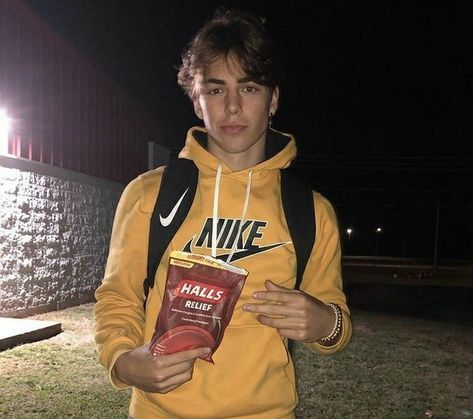
At school, Matt became a local legend. His name, now officially “Matt Bennett,” was on everyone’s lips. Teachers and classmates alike would remark on how “All-American” he looked. At the football games, Matt was cheered on as a hero. His life, once a tangled web of uncertainty and self-doubt, had been rewritten.
Now, he was Matt Bennett, the perfect All-American jock, and he couldn't imagine being anyone else.
One afternoon, as he walked hand-in-hand with Cassie through the school’s hallway, Chase slapped him on the back. “Told you, man. Brunettes are great, but blondes? That’s where it’s at.”
Matt laughed, his perfect white teeth gleaming. “You were right, bro.”
And as he leaned in to kiss Cassie, he didn’t think about the boy he had been before. Why would he? He was Matt Hastings now, the perfect All-American boy.
At school, Matt became a local legend. His name, now officially “Matt Bennett,” was on everyone’s lips. Teachers and classmates alike would remark on how “All-American” he looked. His new, muscular frame made him a standout, but it was his natural charisma and sharp athleticism that earned him respect.
“You know,” one of his classmates commented during lunch, “Matt Bennett... that name just screams All-American jock. It’s like something out of a movie.”
Another added, “Dude’s gotta be the most ‘jocky’ guy in school. I can already picture him playing pro football someday.”
The attention was flattering. He found himself slipping into the role effortlessly, becoming the guy everyone admired, the one who fit the mold perfectly.
But there was something else. It was in the way he now saw the world—through a lens of conservative ideals. Matt often found himself in debates with classmates, his new opinions solidifying as the days went on. He believed firmly in traditional gender roles, the importance of family values, and a strong distaste for liberal ideologies. The political conversations he had once enjoyed with his friends back in England seemed ridiculous now.
One day, during a lunch break, he and Chase found themselves talking about their political views.
“You know what’s messed up?” Matt said, taking a bite of his sandwich. “The way the country’s going. I mean, I don’t know how anyone could vote for those liberals. Everything’s just getting too soft.”
Chase nodded. “Exactly, man. It’s like people don’t want to stand up for what’s right anymore. We need to take America back. Make it great again.”
Matt chuckled. “I’m with you. It’s all about family, football, and freedom.”
Everything about Matt Bennett felt right now. His identity was clear, his life full of purpose, and every moment felt like an affirmation of his new self. He was exactly who he was supposed to be—perfectly All-American, living the life he had never even known he wanted.
And when he kissed Cassie, his blonde, bubbly cheerleader girlfriend, the world felt even more complete. He didn’t think about the boy he had been, the questions he had once asked himself. Why would he? He was Matt Bennett now—an All-American jock, straight as an arrow, and proud of it.
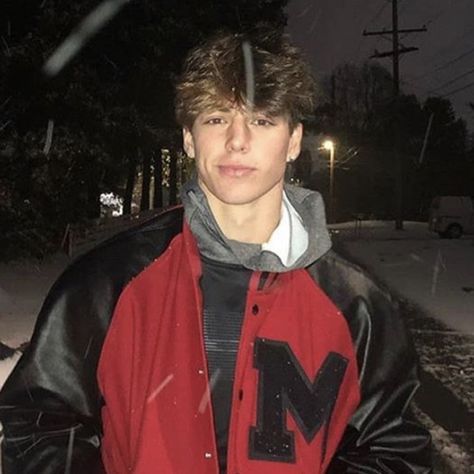
255 notes
·
View notes
Text
Five Summers Gone- Oscar Piastri OP81
Enemies to Lovers × Second Chance × Small Town 5.6K Words (Masterlist) Five years ago, Y/N L/N left Melbourne without saying goodbye—no calls, no letters, nothing. To the town, she disappeared. To Oscar Piastri, her best friend and childhood crush, she shattered everything they’d built.
Now she’s back. Temporarily. And Oscar? He isn’t exactly welcoming her with open arms. Not when he’s spent years pretending he doesn’t care.
TW: Smut but its not essential to the story and can be skipped. 18+

The door to 'The Melbourne Tavern' creaked open, a gust of warm, dry air pushing in with the sound of cicadas buzzing outside. It smelled like dust and sunshine, a hint of salt from the nearby coast mingling with the earthy aroma of wood and old leather. The tavern wasn’t much to look at from the outside—a simple building of peeling white paint and rusty corrugated iron that blended with the small-town landscape. But inside, it had a kind of rustic charm that only decades of local history could create.
The walls were a patchwork of weathered timber and exposed brick, with old beer advertisements and faded photographs hanging crookedly. Some of the frames were cracked, but no one had bothered to replace them; they were part of the place’s charm. The soft golden glow of hanging lamps cast long shadows across the wooden floors, which were scuffed from years of boots and bare feet dancing to the sound of country tunes.
At the far end of the room polished oak with brass handles glowed under the light. Behind the bar, shelves lined with bottles of gin, rum, whiskey, and every kind of beer imaginable caught the light, the labels faded from the sun’s harsh glare that filtered in through the half-open windows. The taps hissed and gurgled, sending chilled streams of amber liquid into glasses that clinked softly against each other.
Near the window, the jukebox sputtered, blasting out the familiar hum of country music, though the volume was low enough to let the conversations around the bar flow freely. The sound of laughter and murmured gossip drifted over the buzz of cicadas from the porch outside, where a couple of men leaned against the rails, pints in hand, talking about everything and nothing.
The air inside felt thick with the heat of late afternoon, the sun casting a deep golden glow across everything—spilling in through the long windows, illuminating the wooden tables with their mismatched chairs. The long, worn bar counter had a few stools scattered in front of it, some occupied, some empty. A couple of regulars lounged by the dartboard, a few more tucked away in the booths by the back corner, whispering quietly, the flicker of dim candles lighting the space between them.
There was a smell in the air, a blend of fried fish and roasted meats from the small kitchen in the back. The place was both familiar and a little overwhelming, like stepping back into a dream she hadn’t quite realized she was in. Every detail—from the scratches in the tables to the old ceiling fan that lazily stirred the air above—felt like it had been here for a hundred years, holding memories of the people who’d come and gone.
The low hum of chatter from the handful of locals drinking in the dimly lit room died down as soon as she stepped through the door. And now, standing here in the doorway, she felt the weight of time—five long years of distance of lost memories, and of unfinished business.
Y/N froze at the threshold, her heart doing an awkward, painful little skip. It had been five years since she last stood in this place—five summers spent in the faraway noise of the city, with the distant hum of life and everything that wasn’t here. But now, the familiar smell of spilled beer, fried food, and wood smoke hit her like a wave, dragging her back to a time she hadn’t wanted to revisit.
Her fingers tightened around the strap of her bag, her gaze scanning the bar. The worn wooden floors creaked beneath her boots as she took a step further in, half-hoping someone would jump out and shout a cheerful welcome, but everyone was strangely quiet. Eyes flicked toward her, some curious, others with that mix of recognition and judgment that could only come from small-town gossip.
On a stool infront of the bar, Oscar Piastri sat with his back to her. His broad shoulders were tense, the back of his black T-shirt clinging to his frame. The man who had once been a small-town kid chasing dreams now stood in the glow of Formula 1 stardom. He was no longer just the boy she’d left behind—he was a racing icon, the kind of person whose name was known across the globe.
But in this pub, to the people who knew him as a child, he was still Oscar—still the young man who had once dreamed of getting out of this town. The same man who had watched her walk away without a word five summers ago.
Y/N’s breath caught in her throat as she stepped further into the tavern, her boots echoing softly on the worn wooden floors. The sound seemed to cut through the room, catching the attention of the few locals scattered around. She felt their eyes on her, a mix of curiosity, judgment, and old gossip filling the space. But her gaze remained fixed on Oscar.
His back was still to her, but the moment he sensed her presence, he paused. The glass in his hand was set down slowly, as if he had suddenly forgotten the motion.
The years hadn’t softened him. If anything, they had made him harder—his shoulders broader, the scruff of his jaw more pronounced, his eyes darker, like he'd been worn down by something deep inside.
Her heart thudded in her chest. The space between them felt like a chasm, but the pull was the same. That magnetic tug she had always felt, the one that was impossible to ignore.
His expression was unreadable at first—until it softened just the tiniest bit, just enough to show that the years hadn’t erased everything. His lips tightened into a hard line.
But what struck her the most was the distance in his eyes. The same eyes that had once held nothing but warmth and admiration for her now seemed cold, distant, almost like she was a stranger.
“Y/N,” he said, his voice low and distant, as though her name was a question he didn’t want to ask. “Didn’t expect you to come back.”
Y/N swallowed, the weight of his words sinking into her chest. She had imagined this moment in her mind for so long, rehearsing her apologies, wondering how she would explain everything. But standing here, now, with the entire tavern waiting for something—anything—from her—it felt too real, too raw.
His words hung in the air, thick with the tension of everything unsaid. Five years. She’d thought about this moment more times than she cared to admit, playing it out in her mind over and over again. She had imagined the words, the apology, the explanation. But now that she was standing here, with the dusty warmth of the tavern wrapping around them, everything she had planned to say felt inadequate.
“I didn’t plan on it either,” Y/N replied, her voice quieter than she meant it to be. She glanced around the bar, a few familiar faces still scattered around. “My aunt... she left me the house.”
Oscar didn’t respond to that, his brow furrowing. He didn’t need to. They both knew what that meant. She wasn’t here just to visit. She was here to close a chapter. The kind of chapter that had ended in a storm, the kind of chapter that had never really been finished.
She shifted uncomfortably, noticing his intense gaze on her, like he was weighing every word. Her fingers fidgeted at her sides. She hadn’t realized how much she had missed this place—the familiarity, the feel of being home. But it also hit her like a ton of bricks, the reality of what she’d left behind.
Oscar set the glass down, his hand brushing the countertop with a soft scrape. His gaze never left hers, studying her like a puzzle he couldn’t quite solve.
“You just show up, after five years, and that’s it?” he asked, his voice sharp, his eyes cold. “No explanation? No... nothing?” The anger in his voice made her flinch.
She swallowed, guilt creeping into her chest. “I—I didn’t know how to explain, Oscar. I didn’t think you’d understand.”
His chuckle was low, bitter. “And you thought running away was easier?”
Y/N's stomach twisted. She hadn’t expected to hear that in his voice—the years of hurt, the bitterness. It stung more than she’d anticipated.
She took a small step forward, but the distance between them felt monumental. “I didn’t want to leave. But I had to.” Her voice faltered, but she pushed on. “It was personal... Too personal that I couldn't even tell you about it.”
Oscar’s jaw clenched, and his gaze flickered briefly to the floor. “You could’ve told me, Y/N. You didn’t even give me a chance to understand.” The words were raw, exposed, the kind of words that could break a person if they weren’t careful.
Oscar’s expression shifted then—anger flaring briefly in his eyes before it was quickly masked by something colder, more distant. "You think I wouldn’t have understood?" he asked, his voice tight. "You think I wouldn’t have been there for you?"
She quickly shook her head, feeling the weight of his accusation in her chest. “I thought I was protecting you,” she whispered. “But I was wrong.”
"I didn’t want to drag you into it," she whispered. "I didn’t want you to feel responsible."
Oscar’s lips twisted into something that could have been a smirk, but it was empty. "I’m not a little kid anymore, Y/N. I’m Oscar Piastri now. You think I don’t have my own burdens to carry?"
She could hear the echo of his Formula 1 fame in his words—the pressure, the expectations, the weight of a career that had taken him far from this dusty town. But beneath it, beneath the success, there was still a man who had loved her and still carried the scars of her leaving.
The bartender's voice broke the silence, offering them both drinks, but neither moved to take one. The tension in the air was thick, heavier than the summer heat outside, and all Y/N could do was stand there, staring at the man she had once loved, wondering if there was any way to undo the damage.
The silence between them was heavy, thick with everything they hadn’t said in years. Then, without warning, Oscar turned his back to her, grabbing his empty glass and beginning to inspect it.
“Do you want a drink?” he asked, his tone colder now, guarded.
Y/N hesitated, unsure of what she wanted. Everything felt wrong, like stepping into a dream she couldn’t wake up from. The man she thought she’d never see again. The town she thought she’d forgotten. And yet, standing here now, she realized she hadn’t been able to move on, not fully.
She nodded, her voice soft. “A gin and tonic.”
Oscar didn’t reply as he requested the drink from the bartender, his back still turned to her. But the tension in the room had shifted. She could feel it in the air. The unsaid things were heavier now, waiting for the moment when they would finally have to confront everything.
He handed her the glass without a word, their fingers brushing just for a second. The warmth of the gin mingled with the warmth of the evening as the first crack in the wall between them began to show.
---
The tavern was nearly empty now. Outside, nighttime had fully settled over the countryside, a velvet sky scattered with stars, cool wind sweeping in through the open windows. Crickets chirped steadily in the distance, and the scent of dry grass and old smoke hung in the air.
Inside, only a soft, flickering pendant light remained above the bar, casting a honeyed glow across the polished wood. Y/N sat alone on a stool, her fingers tracing circles in the condensation of her untouched drink. The glass had gone warm.
Oscar sat by the bar, pretending to count the bottles on the back shelf. He hadn’t said a word in ten minutes. Neither had she.
Finally, she broke the silence. “You’re quieter than I remember.”
He didn’t turn around. “You’re not.”
She let out a small, humorless laugh. “Right. I’m still the mouthy girl who left.”
Oscar turned then, slowly, a bitter smile ghosting across his lips. “You don’t get to make jokes about it.”
Y/N’s chest tightened. “I’m not trying to.”
“Could’ve fooled me.” He leaned against the counter, arms crossed. “One minute we’re planning a future, the next you vanish. Gone. No note, no message. Just—nothing. Like I never existed.”
She stared at him, jaw clenched. “You think I wanted to leave like that?”
“You didn’t stop yourself.”
“Because you made it impossible to stay, Oscar.” Her voice cracked. “You made everything about racing. Everything was about the next circuit, the next win, the next interview. There was never room for me.”
He scoffed. “That’s not fair.”
“Isn’t it?” she said, her voice rising. “I came second to your career every day for two years, and I was supposed to be okay with that.”
“I was doing it for us,” he snapped. “To give us a better life.”
“No,” she said. “You were doing it for you. And maybe that’s okay. Maybe I was stupid to think I’d ever matter as much as the next podium.”
Oscar stared at her, and for a moment, she thought he might yell. Instead, his voice dropped low, tight with something darker. “I used to imagine you in the crowd. Every time I got behind the wheel. I used to look for your face.”
Y/N’s breath caught.
“I used to tell myself that if I just won enough, if I just kept going, maybe you’d see me on TV and… I don’t know. Remember you loved me once.”
“I never forgot,” she whispered.
“Then why didn’t you come back?”
“Because I was scared,” she snapped. “Because every time I thought about you, I felt like I was being tortured from the inside out. Because I couldn’t remind myself that I was just someone who once mattered to you.”
Oscar’s face shifted, something soft cracking through his carefully held anger. “You never stopped mattering.”
There it was again — that unbearable ache. The one that settled into her bones the moment she saw him next to the bar.
She looked down at her hands. “I thought if I left, it would hurt less than staying and watching you drift further away.”
“You should’ve stayed.”
“You should’ve asked me to.”
That silenced him.
The air between them buzzed with the weight of everything they hadn’t said in five long years. It was too much. Not enough. Something in between.
He stood and walked slowly, each footstep with purpose until he stood in front of her.
“You think I didn’t feel abandoned?” he said, quieter now. “You think I didn’t sit in that empty apartment and wonder what I did wrong?”
Y/N’s voice was trembling. “You didn’t do anything wrong. I just couldn’t stand it anymore. I was being suffocated by how overwhelmed it made me”
“I would’ve made space for you.”
“You didn’t see me, Oscar,” she said, eyes glassy. “You saw a girl who was supposed to wait. Who was supposed to clap from the sidelines and smile while you chased everything we dreamed about together — but you did it on your own.”
He looked stricken. And more than anything else, he looked like a boy who had lost something he hadn’t realized was irreplaceable until it was already gone.
“I hated you for leaving,” he whispered. “And I hated myself for not stopping you.”
Tears welled in her eyes. “I hated that I had to leave to save myself.”
Oscar exhaled like he’d been punched. He stepped back slightly, pacing a few steps away, running a hand through his hair. The silence returned, but now it was shaking, fragile, raw.
Then, the faint hum of a song they both knew too well began playing over the radio. He began to tap his fingers on the bar along with the melody.
Y/N froze.
Their song.
He still remembered every note.
She walked over slowly, standing beside him. “I haven’t listened to this since…”
“After you left,” he finished. “Yeah. I couldn’t. Felt like it hurt too much.”
“It still does.”
“Yeah,” he said, glancing at her. “But maybe some things are meant to hurt. If they didn’t, it’d mean they never mattered.”
She didn’t answer. She just watched him tap his fingers, the pain in his movements, the years stitched into each tap on the wooden bar top.
When he finished, she stepped forward, close enough to see the flecks of gold in his hazel eyes. “You’ve changed, Oscar.”
“So have you.”
“But I think part of me still knows you.”
His voice dropped, almost a whisper. “Then don’t go again.”
She swallowed. “I can’t promise I won’t. But I can promise I’ll try.”
He stood, close now—so close the tension between them was electric.
“I hate that I still want to kiss you,” he said, breath warm.
“I hate that I want you to.”
They didn’t kiss—not yet. The moment lingered like a breath not yet taken.
A door creaked in the distance. A chair scraped. Someone was still here.
The moment passed.
Oscar stepped back, eyes burning. “You should go.”
Y/N hesitated, heart pounding. “Yeah. I should.”
But neither of them moved.
---
The sun bore down mercilessly on Albert Park, casting a shimmer over the track and painting the race paddock in hues of black and red. The smell of gasoline and scorched rubber clung to the air, thick and sharp. Crowds pressed at the fences, their excitement electric, a kind of collective heartbeat that pulsed louder than the engines in the distance.
Y/N stood on the edge of it all, fingers curled tightly around the lanyard that bore Oscar Piastri’s name.
She hadn't planned on coming. She’d told herself over and over she wouldn’t. That she couldn’t.
But when she’d found the VIP pass slipped under her door, attached to a single note — “If you come, I’ll know” — something in her cracked.
Now she was here, at the very place she’d sworn never to return to. The world she’d tried to leave behind. The life she'd tried to untangle from her heart. But it never really left her. And neither did he.
Oscar stood by his car in the garage, helmet under one arm, race suit hugging his form like a second skin. He wasn’t looking at her. But he didn’t need to. He knew.
She didn’t know what they were now. But she knew she couldn’t walk away this time.
Not again.
Now she stood in the shade of the garage awning, watching the man she’d once loved — maybe still loved — suit up, visor down, the sun glinting off his helmet as he prepared for the race.
Oscar didn’t look at her, but she knew he knew she was there.
He always knew.
The race began with the scream of engines and a blur of motion.
Oscar took the first few corners clean, locking into P2 by Lap 3, breathing down the neck of the Ferrari in front. His movements were precise, razor-sharp. But there was something underneath — something Y/N could feel more than see.
He wasn’t just racing. He was pushing.
Too hard. Too fast. Too much.
And she recognized it. That desperate, reckless edge. He was driving like he had something to prove — or something to lose.
The commentary praised him. "He's on fire today—like a man possessed."
Y/N’s stomach twisted.
The commentators said it was brilliant. Ruthless. But Y/N’s chest tightened with every lap.
By Lap 20, Oscar was still in second but gaining, corners carved with fury, tyres crying against the asphalt. The engineers were calm, but Y/N could hear the tension in their voices as they radioed him.
“Oscar, box in five.”
No response.
“Oscar, do you copy?”
Still nothing.
Her heart climbed into her throat.
She knew this Oscar — the one who didn’t hear anything but the roar in his own head. The one who couldn’t stop until the fire inside him burned out everything around him.
Then, Lap 41.
He went wide into Turn 10, trying to force a move where there wasn’t one. The Ferrari twitched. Oscar overcorrected.
The car clipped the curb.
Sparks exploded from under the chassis. The rear end snapped.
And then it happened.
A sickening spin, tyres lifting momentarily before the car slammed sideways into the barrier with a thunderous crack that silenced the crowd. The halo held strong. But the front wing had completely disintegrated. Smoke poured into the sky.
The screen froze on the impact.
The screen showed the wreck: smoke pouring out, marshals racing toward the scene. The safety car was deployed instantly. Mechanics scrambled.
Gasps rippled through the paddock.
Y/N couldn’t move.
She didn’t breathe.
Her mouth was dry. Her body ice-cold. She felt everything and nothing all at once. Around her, the team was in motion, alarms blaring, radios crackling.
But all she could hear was the silence in her chest.
Then—movement. Oscar’s head, helmet still on, shifting.
He was alive.
But she was already running.
She didn’t wait.
She ran.
The medical center was a blur. She pushed through crowds, security, yelling voices — she didn’t care. Not when she could still see the image of his car mangled against the wall. Not when every second that passed without seeing his face felt like a countdown to collapse.
"Miss, you can't be here—"
“I have to be,” she snapped. “He left me a pass. He wants me here.”
The nurse gave her a cautious look, then sighed, stepping aside.
“Y/N?”
And there he was.
Sitting on the edge of the hospital bed, shirtless, bruised, a long scrape down his ribs, and his arm cradled in a sling. He looked up at the sound of the door.
And everything in her broke.
“You complete idiot,” she whispered.
His lips curled into the faintest smile, worn and pained. “Hi.”
She crossed the room in two steps and shoved him.
“You reckless, stupid, arrogant—” her voice broke as she hit him again, this time open-palmed to his chest, and he winced. “You could’ve died, Oscar! What the hell were you thinking?!”
“Y/N—”
“You could’ve died!” repeating as she sobbed. “I saw it. I saw your car hit that wall and I thought—god, I thought that was it. I thought I’d lost you again.”
He grabbed her wrists, gently, holding them between them. “I’m here.”
“Why were you pushing so hard?” she asked, shaking. “You were leading! You had it.”
He flinched. “I just thought that maybe if I won, you’d see I’m not the same guy you left.”
“I never needed you to win anything!” she shouted. “I needed you to fight for me. For us. Not throw yourself into a wall just to prove some twisted point!”
Tears spilled freely down her cheeks now. “You were always enough. It was never about the trophies.”
“I missed you,” he said, voice raw. “Every single day. Even when I hated you. Especially then.”
She shook her head, tears in her eyes. “You don’t get to say that.”
“Why not?”
“Because you didn’t come after me. Because you let me go.”
“I thought I was giving you what you wanted,” he said, looking at her like the truth might kill him. “You left without a word.”
“Because I was falling apart!” she cried. “Because I didn’t know who I was outside of you, and I was terrified you wouldn’t love the version of me that didn’t orbit your world.”
Oscar swallowed hard. “I loved all of you. Even the parts you tried to hide from me.”
Y/N moved closer. Her voice was barely above a whisper. “Then why did it feel like I was always chasing you?”
“Because I didn’t know how to slow down.” He met her gaze, broken and honest. “Until now.”
The silence between them was thick — loaded with pain, regret, and everything they'd never said.
He looked at her then — really looked — like he was seeing every version of her he’d ever loved, ever hated, ever mourned.
“You came back.”
“I couldn’t stay away this time,” she said, voice shaking.
There was a pause, the kind that holds all the weight of things finally understood.
And then he kissed her.
It wasn’t soft.
It was desperate.
A collision of grief, guilt, love and longing, five years in the making. Her fingers threaded into his curls as his hands slid to her waist, pulling her between his knees. The kiss deepened, their breath mingling, hungry and terrified and real.
His hands pulled her in, even with the pain in his arm. Her fingers gripped the back of his neck, their mouths crashing, devouring, pleading.
She pulled back first, breathing heavily. Her forehead rested against his. “Don’t do that again.”
“I won’t,” he whispered. “Unless you leave again.”
“I’m not going anywhere.”
Oscar’s fingers brushed down her cheek. “Promise?”
“I promise,” she said. “But you need to promise something, too.”
“What?”
“That next time you want to prove something to me… just tell me. Don’t nearly die over it.”
A breathy laugh escaped him. “Deal.”
Y/N smiled through her tears and gently, slowly, leaned into him again. This time the kiss was softer. Tender. Like the feeling of forgiveness.
And outside the walls of the medical center, the race raged on.
But here, time finally slowed.
---
Outside, the city pulsed with celebration. A dull roar of nightlife drifted through the floor-to-ceiling windows, but up here, the world had narrowed into something quiet. Almost sacred.
The suite smelled faintly of rain on pavement and clean cotton sheets. The lamps cast a warm, amber glow, softening the sleek modern lines of the room. A forgotten bottle of sparkling water sat half-finished on the nightstand. The television playing the news on mute, replaying the crash over and over — the same brutal spin, the same moment Oscar’s car hit the barrier.
Y/N had turned her back to it. She couldn’t watch it again.
Instead, she watched him.
Oscar stood by the window, one arm braced on the glass, the other resting in a black sling across his torso. The light haloed around him, outlining the sharp lines of his shoulders and jaw, the mess of his dark curls slightly damp from a rushed post-hospital shower. His T-shirt was wrinkled from the day but still clung in the right places. Bruising peeked from beneath the collar, dark and angry against his otherwise golden skin.
She hadn’t been able to stop touching him since they returned. Just little things — her hand on his arm, her fingers brushing his ribs to make sure he was real.
Oscar hadn’t stopped looking at her either.
“You don’t have to hover,” he said quietly, not turning around. “I’m not going to spontaneously combust.”
She sat on the edge of the bed, heart a clenched fist in her chest. “You kind of already did.”
He finally turned.
There was something showing in his eyes emotionally stripped raw. His defenses were down, fractured open by the impact and her lips hours ago in the medical centre. The heat in his gaze wasn’t just desire. It was regret. Longing. Need.
“I’m sorry,” he said simply.
“For crashing?” she asked.
“For everything.”
Y/N stood and crossed the room slowly, until she was inches from him. The city lights outside cast fractured reflections across his face — half in shadow, half in gold.
She raised a hand to his chest, letting her fingers splay over his heartbeat. “Don’t be sorry right now” she whispered. “None of that is important now.”
A beat passed.
Then she added, softer, “I missed you. I hated how much, but I still did.”
He exhaled slowly. “Every time I thought I was over you… it would blindside me again. In the shower. In the car. Walking past someone who smelled like your perfume.” His hand lifted to brush a strand of hair from her cheek. “Tonight, when I saw you in the garage, I thought I was hallucinating.”
“You weren’t,” she murmured. “You pulled me back.”
Oscar leaned in, breath ghosting her cheek. “I’m tired of pretending it didn’t miss you.”
“So, stop pretending.”
He kissed her gently; he put so much emotion into such a simple and delicate kiss. The kiss was telling Y/N all the words she needed to hear from Oscar. She gently lifted his shirt taking a glance at his bruises and cuts.
“I should be the one taking care of you,” she whispered.
“You are.”
She kissed the line of his jaw, breath stuttering. “You feel like home.”
He smiled against her mouth. “Then stay.”
And when they collapsed into the sheets the world outside faded. No engines. No lights. No press. Just the aftershock of something deeply real.
Oscar pulled her into his chest, his voice barely a rumble against her hair.
“This time,” he said, “I’m not letting you go.”
And Y/N, wrapped in his heat, whispered back, “Good. Because I’m done running.”
--- 18+ (CAN BE SKIPPED)
The city below them had long been quiet, but inside the hotel room, the air still burned.
Y/N lay stretched across the sheets, chest rising and falling in quiet waves, her fingers tracing idle patterns over Oscar’s bruised skin. He watched her from where he sat, propped against the headboard, eyes heavy-lidded and unreadable. His sling was off now, set aside like every other barrier between them.
Her fingers moved lower. Across the sharp dip of his hipbone. The waistband of his boxers.
She felt the shift in him immediately — the way his stomach tightened beneath her touch, the soft hitch of breath.
But he didn’t stop her.
Instead, he caught her wrist. “Don’t tease me.”
The heat in his voice made her clench around nothing.
“I’m not,” she whispered, crawling over his lap, straddling him slowly. “Unless you want me to.”
His hands gripped her hips. Firm. Possessive.
“I’ve wanted you,” he murmured, voice wrecked, “since the second I saw you again. And it’s fucking killing me how good you still feel in my arms.”
Y/N leaned in, brushing her lips over his ear. “Then take me like you’ve been needing to.”
Something in him broke.
He surged up, flipping her onto her back with a sharp exhale, mouth crashing onto hers. It wasn’t soft. It was messy, all tongue and teeth and barely contained hunger. Her thighs fell open around his hips as he pressed against her, hard and aching through his boxers, grinding into her like he couldn’t help it.
“Tell me this is mine,” he growled, dragging her panties down her legs, his fingers slipping through the wetness between her thighs.
“It’s yours,” she gasped, legs trembling. “It’s always been yours.”
He pushed two fingers into her without warning, his thumb circling her clit with practiced precision. She cried out, nails digging into his shoulders as her body bowed up against him.
“Look at you,” Oscar muttered, watching her writhe beneath him. “Dripping for me. I’ve barely touched you.”
She bit her lip hard. “Stop talking and fuck me.”
He smirked. “Say please.”
Her eyes flashed. “Oscar—”
“Say it.”
She reached down and wrapped her hand around him through the fabric of his boxers, squeezing just enough to make his breath stutter.
“Please.”
He shoved his boxers down, not even bothering to kick them off fully before lining himself up and slamming into her in one desperate, blinding thrust.
She cried out, the stretch brutal and perfect.
His hand tangled in her hair, dragging her mouth back to his as he thrust again, hard and deep. “You feel so fucking good.”
Her legs wrapped around his waist, pulling him in deeper. He moved like a man unhinged — hips snapping, breath ragged, forehead pressed to hers.
Each thrust was laced with everything they hadn’t said. Every heartbreak. Every unanswered call. Every regret that clung to them like a second skin.
“I thought I lost you,” he panted, voice breaking. “Every day I told myself it didn’t matter — but it did. You did. You fucking destroyed me.”
Y/N cupped his face with shaking hands, dragging his mouth back to hers. “Then ruin me right back.”
And he did.
He fucked her like it was the only way he knew how to continue living. Like claiming her again might put the broken parts of him back together.
She moaned his name over and over, clawing at his back, thighs trembling around his hips as he pounded into her relentlessly. Every thrust sent stars behind her eyes. Her orgasm hit hard and sudden, clenching around him with a cry.
Oscar’s rhythm faltered. His jaw clenched. “Fuck, I’m gonna—”
“Inside,” she begged. “Please.”
That broke him completely.
With a guttural groan, he buried himself deep and spilled inside her, hips jerking, body shaking with the force of it.
They collapsed together, skin slick with sweat, limbs tangled.
Silence settled around them like ash after fire.
Oscar didn’t speak. He just pulled her close, pressing kisses to her hair, her shoulder, her temple. Everywhere he could reach.
Y/N clung to him, heart still racing, the weight of what just happened heavy and terrifying in her chest.
But when he whispered, “I’m not letting you leave again,” she believed him.
For now, that was enough.
#australia#oscar piastri#formula 1#enemies to lovers#friends to lovers#fanfic#oscar piastri fanfic#op81 x reader#oscar piastri x you#oscar piastri smau#oscar piastri imagine#oscar piastri x reader#smut#x reader#suggestive#feeling spicy#angst with a happy ending#light angst#angst#slow burn#mclaren
174 notes
·
View notes
Text


Now for the 1920s reimagining of Jonathan Crane ! sorry this explanation is even longer lmao
As everyone's been saying, I should do the rest of the Dork Squad to match 1920s Jervis, and so here is my Jonathan! Easily the hardest to draw out of the three-- but I must say! Despite being outside my expertise, I'm a little surprised how much it looks exactly like I was imagining! Even if it took me ages but that's just procrastination lmao.
Anyways! What is his deal? Well, for one, design wise I did go a more drastically different direction from his usual look by doing a literal scareCROW. He's much more bird like, with a plague doctor mask being common imagery in steampunk, but he's still very southern themed with his messy broken overall strap and patchwork coat. Even his wings are rustic. ( he can't fly just glide btw lol ) Also! I leaned hard into the color orange instead of his usual green gas because it..... bugs me that both Crane and Nygma have a bright green in their color palette. I just want them to have distinct colors if they're going to be a trio. And look how vintage halloweeny he looks !!
So why is he so well dressed out of costume? Well! This Jonathan Crane is not a psychologist at all, here he is the very successful grandfather of horror movies in the silent film era. ( An illustrious origin, i hope canon Crane would be proud lmao ). This is referenced in how his face looks, he's wearing white powder and black makeup that's usually meant to emphasize key features on blurry film like his upper lip and around his eyes. And yes, he just keeps his makeup on during most events, and people just accept he's a little on the... eccentric side.
To me, the archetype of the mad artist fits Jonathan's vibe perfectly. When it comes to striking fear, he's a perfectionist, a trait that drove him to learn every single skill necessary himself, from costume design to props to making his own cameras to mechanical engineering, to.... a "fear gas" that was supposed to gently encourage immersion in the audience but ended up becoming a dangerous chemical weapon.
For his origin crime I am thinking !! Full blown Scooby Doo style monster mystery!! With some nuance! Crane, as a first impression, gives off an immediate air of pompous, aggressively impatient, pretentious director type. His presence is big and dramatic, but its distinctly not southern-- in fact, he seems to play up something between a hollywood accent and a thespian one. But this is all to cover for his farm hick background that he was once very ashamed of.
As a child of a failing farmhand during an infamously dry and dusty era, Jonathan developed an extreme resentment for his country existence from both the bullying of other children for all his strange quirks and the severe verbal and physical abuse of his father, driven to alcoholism by the stress of poverty and the loss of his wife. Originally offering his artistic ideas as a means to help them, he grows sick of their closed mindedness and berating and runs away to learn about the emerging potential of film in Gotham City.
Its been many years, Jonathan now in his early 30s, he finds himself surrounded by the shallow, champagne aristocrats that reflect his childhood bullies. Feeling wrong in his own skin, he develops a sightly unhealthy obsession with the escapism he finds in performing as the monsters in his movies.
But upon discovering that the corrupt rich of Gotham plan to push legislation that would negatively effect farmers like his own history, and that they expected him to be amongst those who support it, his irritation with the shallowness of society reaches its limits. In day, he would feign support for their behavior to cover his tracks, but at night he would don the mask of the Scarecrow, rumored to be the vengeful spirit of a farmer who was hanged, and who he believes to be a more freeing expression of himself than his true face, targeting not just the rich but striking fear in their laborers to scare them off land. And it works. So, he tries bending the will of society more.
Is he doing this out of any moral conviction or just spite and a love for the role? It's... hard to say.
As the Scarecrow, his methods are so effective he's near uncatchable, even by Batman. Its only by solving the mystery of who is under the mask are they able to catch him. They surprise him during one of his screenings, jump him in the dark, and prove his subtle use of fear gas in the theater to the police once he's cornered. Instead of being angry, he goes to the mad house applauding Batman's performance.
What an interesting character they play. He's very inspired.
#( anyways uh I hope you like what i came up with ! lol )#batman scarecrow#batman villains#1920s gotham#1920s#1920s Scarecrow#vintage#fanart#dc comics#Jonathan Crane#scarecrow
870 notes
·
View notes